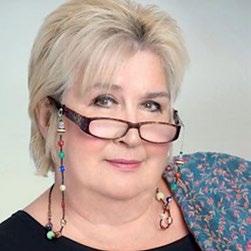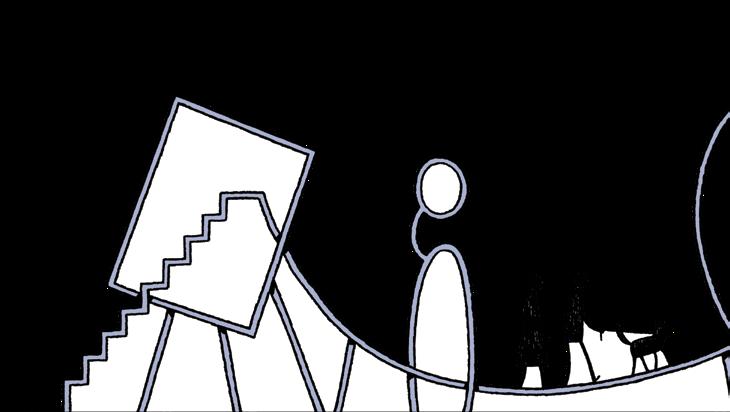of the many professional slights that so wounded him in later years. Meanwhile, his family, noticing the first signs of the onset of his dementia, knew that if he had been able to recognise it, he’d definitely have wanted it to be recorded. So they allowed his friend Richard Denton to film the increasingly speedy diminution of that prodigious mind and fast-talking brain. Denton captured how a vast repository of knowledge, scientific and artistic, disappeared – including the blackly funny moment when Dr Miller wiped his wife, Rachel, the GP, from the slate. ‘Married? I never married anyone!’ ‘You did. You married Mum,’ said son William. When Miller junior, author of Gloucester Crescent: Me, My Dad and Other Grown-ups, approached the BBC with this fascinating material, they still turned it down. But he did manage to achieve ‘a precious hour on Radio 4’. The resulting Archive on 4 – recording the confusions and repetitions, the increasingly tragic oblivion – reflected just what riches the TV boys had turned down. How any programme gets commissioned – the labyrinthine contortions and compromises people go through to create what later proves an obvious hit – made a hilarious series last year. It has just been re-run (and is available on Sounds.) What’s Funny About… gathered together the people behind programmes such as Blackadder, Goodness Gracious Me and The Thick of It. There really is no better company than actors and broadcasters reminiscing: The Oldie’s John Lloyd on how Stephen Fry made funny lines funnier; Meera Syal on the genius of such sketches such as ‘I could murder an English’; and Armando Iannucci on getting the highest-ever count of F-words in a single half-hour (to hear this, I had to tick a box saying I was over 16). In our cancel-culture climate, given the terrorism of the Twittersphere, one can see how such programmes as The Kumars at No 42 were doomed. No one who met Piers Plowright, the inspirational radio-documentary-maker, ever forgot his handsome looks, his good humour or his hat. When Plowright was interviewing, ‘Ordinary people came out with things that stop your heart,’ said Simon Elmes on Last Word. Please may we hear a repeat of Nobody Stays in This House Long which won the Prix Italia in 1983, in which Plowright recorded a genteel Edwardian couple leaving their Kensington home after 55 years, sorting their things. ‘Here’s an opium pipe,’ said the old gent. ‘And this wonderful stamp collection. Do boys collect stamps now?’ 66 The Oldie September 2021
I enjoyed Markie Robson-Scott’s childhood memory: ‘My grandmother used to eat our pets. She ate our rabbit, two summers running, and the next summer she ate Donald Duck!’ This was in Ysenda Maxtone Graham’s book British Summer Time Begins. It was on Radio 4 Extra, a refuge of this summer when our incredible success in Olympics and A levels made us all incredibly proud and was so incredibly surreal. My other refuge was the New Statesman podcast on corrupt and useless politicians, in which Ian Hislop ranted to Iannucci about spads – ‘just mates’ – and cronies. By summer’s end, weren’t we all shouting at the wireless?
TELEVISION ROGER LEWIS The elephant in the room with Morecambe and Wise is homosexuality, or rather the fear of being mistaken for a homosexual: ‘Hey, gerroff! I’ll smash your face in!’ is a frequent threat. The embracing and fighting, the lapel-grabbing and face-slapping, and the rapprochements: it was Eddie Braben who’d noticed how intertwined the comedians were, with a friction that seemed more like a marriage. They share a flat, they share a bed, and they were obsessively interested in genitalia and a fear of castration: ‘I’ve got one’ – ‘Haven’t we all’; ‘He must have a party piece’ – ‘I haven’t looked’; ‘Hitchcock?’ – ‘He might have – I didn’t ask.’ In the classic scripts Braben wrote, capturing Eric and Ernie’s weird domesticity, the suggestion of homosexuality is enough. A trace, a vestigial clue to what lies beneath. What we see is not what we are seeing – that pipe that is not a pipe, as Magritte would say. And Eric kept a pipe with him in the bedroom scenes ‘for the masculinity’, as he once told an interviewer. ‘I basically always make it as mannish as possible by smoking a pipe. Have you ever met a queer with a pipe?’ (Graham Chapman?) In The Lost Tapes,
based on a BBC canister found in the attic, and unseen since October 1970, the comedians went through their familiar paces. Jokes about Ernie’s baldness (‘You can’t see the join’), ventriloquist gags, silly policeman routines. Watching a hospital sketch, where pipe-puffing Eric comes to visit a prone Ernie, Ben Miller, a talking head, remarked perceptively, ‘You can see how lonely he’s been without him.’ By and large, however, Derek Griffiths, Jonathan Ross and Bonnie Langford went in for a lot of forced laughter. The lost tapes would have been better off remaining lost. More elephants, more rooms, in Sex/ Life, a soft-core series, which Gyles Brandreth freeze-frames. The glaring, unmentioned suggestion here is, despite decades of feminism and equality and empowerment, that what women want is the same as ever it was, ie to be defined by their need for a jolly good seeing-to from glowering hairy he-men, who loom from the shadows, saying, ‘Let me take you for a ride!’ In this programme, the peculiarly christened Billie Connelly is tired of being a mother, and tired of her nice, responsible husband, a Wall Street investment banker called Cooper. Instead, she is tempted by ‘gamechanging sex’ with an Australian record-producer, going by the name of Brad. Brad and Billie have midnight swims in a twinkling rooftop pool, where what ensues George Melly used to call yodelling in the cavern. There was another clinch in a railway tunnel. Billie’s justification for adultery – or, as dramatised here, rampant selfishness – is that ‘traditional sexual monogamy is unheard of in the animal kingdom’, which will surely come as news to Catholics and penguins. When watching Baptiste, I wondered if I’d had a stroke, I was so foxed by the structure. One minute, Tchéky Karyo was sporting a bushy beard; then he wasn’t. Fiona Shaw was in a wheelchair; then she wasn’t. Then she was, and the big beard was back. Plus Fiona was now rainswept and swearing, glaring at everyone with resentment. No wonder, as, ostensibly the Ambassador to
Best of friends: the Morecambe and Wise bed scene, inspired by Laurel and Hardy






































